How Many Cats Is Too Many? Potential Health Concerns & Care Requirements
Updated on
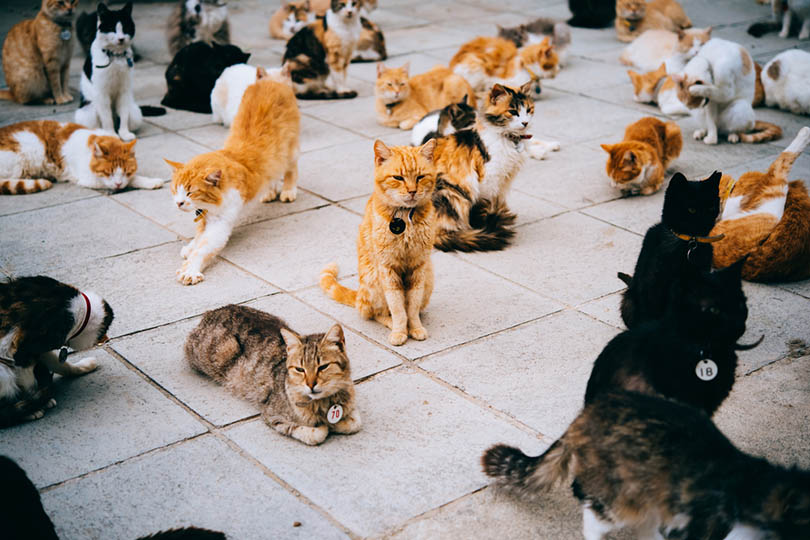
Once you have one cat as a pet, it’s easy to want more and more. Who doesn’t enjoy their sweet cuddles and lovable personalities? The temptation to get more cats increases whenever you see a stray or someone giving one away.
Pretty soon, you could have three, four, or even five cats. If that sounds like a lot to you, believe it or not, some people have even more. But exactly how many cats are too many? At what point does owning many cats classify as hoarding? And are there any laws that determine how many cats you can own? In this article, we’ll explore the ins and outs of owning more than one cat.
Can You Have Too Many Cats?
We’ve all heard and seen pictures of the “cat lady” stereotype, in which someone has 10 or more cats running around their living room. But the reality is that some people do have that many cats that they may or may not be able to take care of.
With that being said, it is possible to have too many cats, especially when it comes to a point that you can no longer provide them with the care that they need. No matter what a person’s reasons are for having so many cats, at some point, you must realize when you have too many. Otherwise, it could end up negatively affecting both the cats and you.
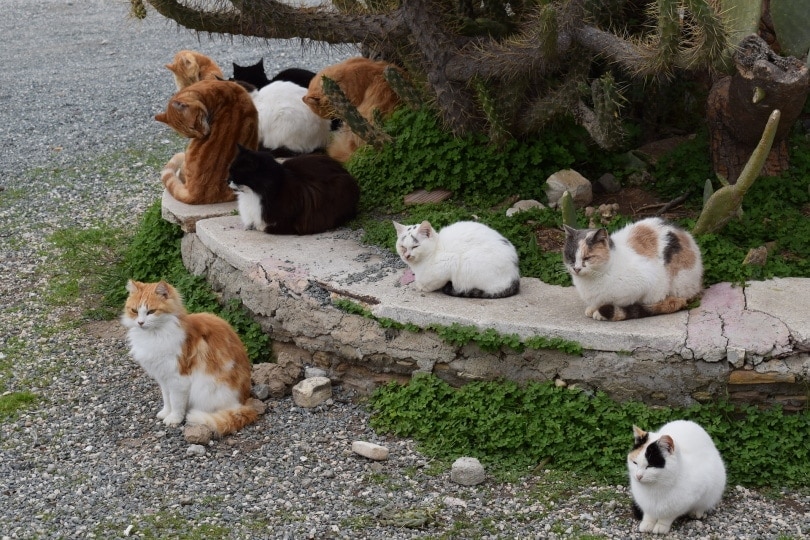
How Many Cats Is Too Many?
Non-cat lovers tend to think that one cat is too many, while other people have five or six cats that are well-cared for. Because of this, it’s hard to say exactly how many cats are too many. It just depends on the person as well as several other factors.
A general guideline, though, is that you have too many cats whenever you can no longer care for the cats that you have properly. Sometimes a person realizes on their own that they don’t need any more cats, but sometimes it takes a lack of space, supplies, or money to support the cats to realize that you have too many.
In some cases, people continue to acquire new cats even though they are struggling to take care of the ones that they own. This is the sign of a much larger problem, which we will discuss later. But, if you are worried that you might have too many cats, here are some factors to consider.
Emotional Bonds
Humans who truly care about their pets quickly form emotional bonds with them, whether that be a cat, a dog, or something else. But humans aren’t the only ones that form emotional bonds. Our pets form emotional bonds with us as well.
In fact, one study has shown that cats and kittens form emotional bonds with their owners in much the same way that human infants do. What the study did was put cats alone in a room with their owners for two minutes, and then they spent two minutes apart. After being reunited with their owners, they classified the cats’ reactions into different attachment styles.
At the end of that study, they found that 65% of cats and kittens were classified as being securely bonded to their owners, which is very similar to that of human infants. However, the problem with owning multiple cats is that it becomes difficult for cats to form healthy bonds if they have to share you as their owner.
It may not seem like a big deal but being unable to form healthy bonds can have a negative effect on the overall well-being of cats. Having too many cats can lead to attachment issues, jealousy, or even depression if some cats aren’t getting the attention that they want.
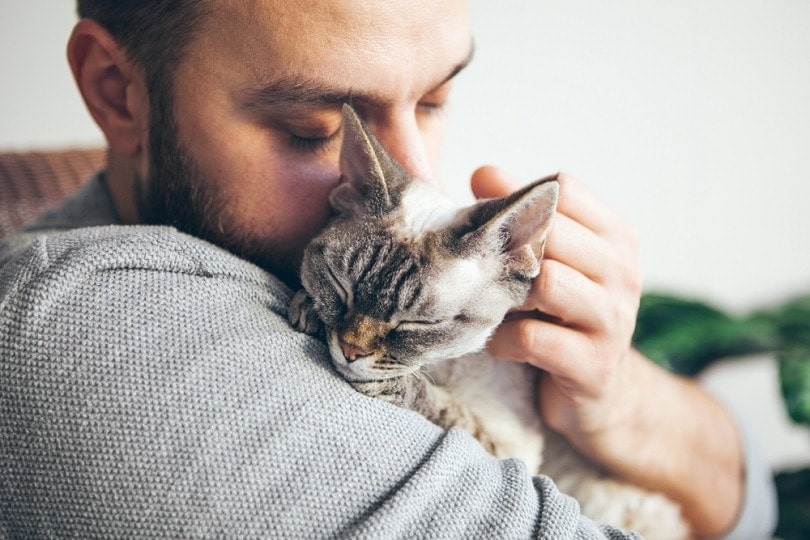
Health Concerns
Another issue with having too many cats is health concerns. There are multiple things to be concerned about regarding a cat’s health. For example, let’s say that one cat gets worms as a result of having fleas or some other source. You notice those worms as you clean out the litter box. But if you have more than one cat, it can be difficult to determine which cat has the worms (assuming that they haven’t been transmitted to the other cats yet).
Not knowing which cat has worms may lead you to have to take all of the cats to a veterinarian to be treated. As you can imagine, this can be expensive (more on that later). It’s not just true for worms, but for other transmittable health conditions as well.
Space and Resources
People often assume that it’s okay to have a lot of animals if you have a big enough space for them to stay in. While having space to accommodate a lot of animals is important, you also have to be able to provide them with the resources they need to stay healthy and survive.
For example, having a lot of space for animals means nothing if you have eight cats and only one litter box or if they all must share the same food bowl. Just like humans, sometimes animals like to have their own space as well and they may not want to share with other cats.
With that being said, you could reasonably have two or three cats in a small apartment provided that you have the resources to accommodate them. According to Purina, you should have one litter box for each cat you have, plus one extra litter box. If you don’t have enough litter boxes, it could cause your cats to relieve themselves elsewhere, which is not an ideal situation for you or them to be in.
In addition to food and litter, cats need water, a place in which they feel safe, and toys to help keep them stimulated. Some cats just aren’t going to want to share if there aren’t enough resources, which could lead to competition, undesirable behaviors, and general unhappiness from your cats.
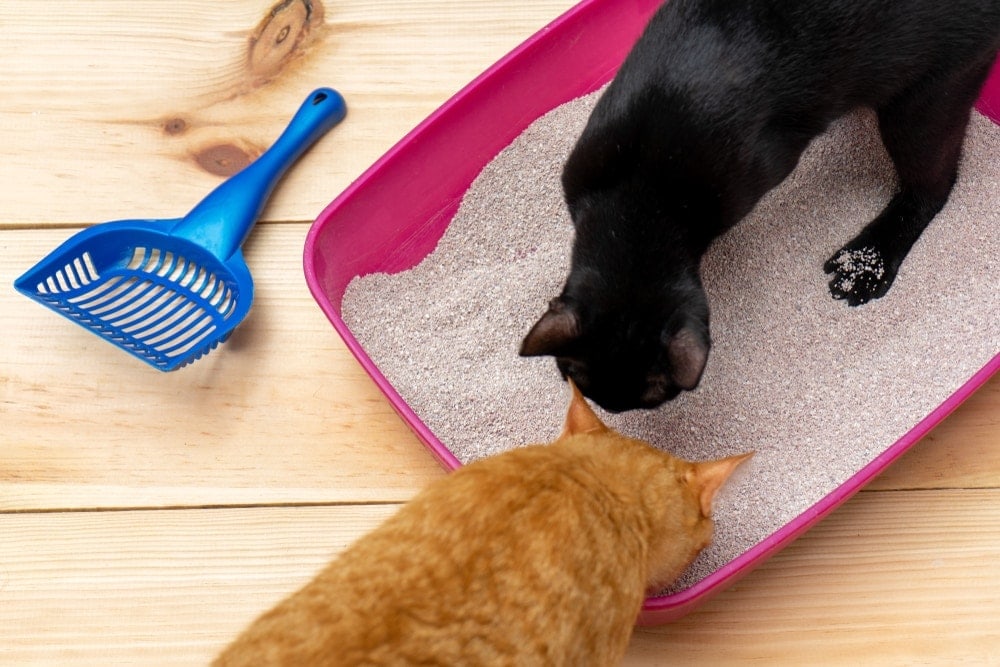
Money
Providing enough resources for your cats requires money, and it’s not uncommon for people to have more cats than what they can reasonably support financially. But money isn’t just required to buy food, litter, and other supplies.
More cats mean more money that you’ll be spending on vet bills, which is essential to providing them with proper care. Vet bills aren’t cheap even for a standard checkup, not to mention the cost of treatment for illnesses and having your cats spayed or neutered to prevent more cats.
But you also have to make sure that you have enough money to support your own needs. Buying food and supplies for yourself, in addition to paying for your living accommodations and other bills, shouldn’t slide just because you need that money to pay for pet supplies. And the more cats you have, the more those supplies are going to cost.
Cat Personalities
One last thing to consider when deciding how many cats is the personality of the cats. Some cats will get along with other cats easily, while others can take a lot longer to warm up to each other. And then, some cats just don’t want to be around other cats at all.
If the personalities of your cats don’t mix, this can cause problems as well. It could lead to cats fighting, withholding food and resources, or even depression from cats who don’t want to be around other cats all day.

How Many Cats Can You Legally Own?
Just like there’s no set number for how many cats are too many, there’s no set number for how many cats you can legally own. With that being said, there may be certain instances in which you are only allowed to legally own a certain number of cats, but the numbers vary.
According to the Cat Fanciers’ Association (CFA), most “limit laws” for how many cats you can own are determined or enforced at a local level rather than a state or federal level. That means that even though your state of the country may not have a limit law regarding cats, your city or town might.
Plus, if you live in an apartment, rental home, or are a part of a homeowner’s association, they can set their own rules for how many cats you’re allowed to have. While these aren’t necessarily like laws that a city would create, they can be legal and binding agreements if you sign a contract stating that you may only have a certain number of pets.
When it comes to limit laws regarding cats, sometimes the limit is one to two or an apartment or rental home. If a city passes a law, the limit for the number of cats you can have is usually three to five.
Plus, some laws specify that you may only have a certain number of pets and don’t specifically mention cats. In that case, you may be able to only have one or two cats if you have a dog as well.
It’s a good idea to check your local laws if you have a lot of cats or feel like you have too many. The last thing you want is to unknowingly break the law and have to pay fines or have some of your pets taken away.
How Many Cats Is Considered Hoarding?
If you have multiple cats, something else to consider is whether you are hoarding them. However, it’s worth noting that there is a distinction when it comes to just having a lot of cats versus hoarding cats.
Dr. Kirk Miller, a Doctor of Veterinary Medicine, says that hoarding isn’t necessarily determined by the number of pets you have, but by continuing to acquire more pets even though you can’t properly care for the ones that you have.
That means that a person with seven cats isn’t hoarding as long as they can take care of them properly. But a person with seven cats that can’t care for them would be hoarding, especially when they continue to get more cats on top of that.
Hoarding Variables
Some people can hoard animals differently as well. For example, some people genuinely care for cats and feel the need to rescue them even though they can’t care for them. Other hoarders may not necessarily care for the animals, they just acquire them just to have them or exploit them in some way.
It’s also worth noting that hoarding, in general, is a type of mental disorder in which people collect or save items even if they don’t have any meaning. People who are diagnosed as hoarders often have a hard time getting rid of possessions because it brings them stress or anxiety.
The difference between hoarding in general and hoarding cats or other animals is that animals are living things that a person is collecting and therefore they require actual care. But, there are debates as to whether or not animal hoarding should be listed as a separate disease.
However, animal hoarding is still a type of hoarding, which explains why some people continue to acquire animals even though they can’t care for them. Sometimes, it’s due to an emotional attachment to the animals. But sometimes, acquiring animals is one way that people cope with stress, especially after a life-changing event.
To sum up, as with general multiple cat ownership and legality, no set number of cats qualifies as hoarding. Rather it depends on several other factors and on your ability to take care of those animals. If you do feel like you’re in a hoarding situation with cats (or you know someone who is), you may wish to reach out to a medical professional for advice.
What Can You Do If You Have Too Many Cats?
If you aren’t in a hoarding situation, but you do feel like you want to get more cats, there are some things you can do. Before getting another cat, ask yourself questions such as, “Do I have room for or attention to devote to another cat?” Or “Can I support another cat financially?” If the answer to those questions was no, then getting another cat is not a good idea.
However, something you can do if you feel like you must help stray or homeless cats is to volunteer at a local animal shelter. That way, you can still be in the company of cats without being the primary caregiver or having to take them home with you.
If you realize that you have more cats than you can reasonably care for due to lack of space, resources, money, or any of the other reasons listed above, the best option is to consider rehoming some of your cats. There are several ways to go about this.
One way is to reach out to friends and family to see if they would be willing to take in one or more of your cats. That way, you could still see the cat. You just wouldn’t be the primary caregiver. You can also post online to pet adoption groups or your social media pages.
However, in either case, you’ll want to be very cautious about who you give your pet to and make sure that they have good intentions. Make sure that you ask lots of questions so that you can trust them to take good care of the cat.
And remember that it’s better to keep a cat and care for it, or give it to someone who will, than abandon it somewhere. If you have no other options, then reach out to a no-kill shelter to see if they can take your cat rather than just dropping it off somewhere by itself.
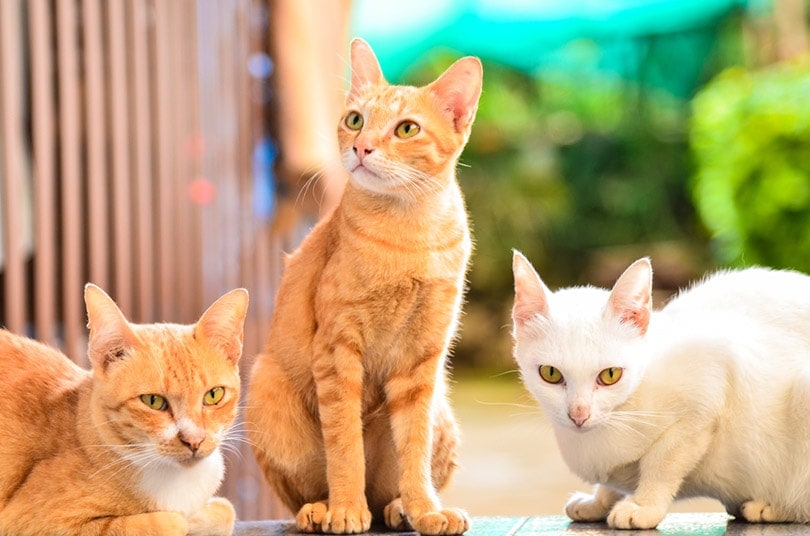
Final Thoughts
After reading the above, you’ve probably realized that there is no set number as far as how many cats are too many. It just depends on how many you can reasonably take care of and whether your cats get along.
Some people may be fine with having five or six cats if they have the space, resources, and money to support them, and the cats all get along with each other. But for other people, two or three cats can be too many if you aren’t able to care for them properly or if your cats don’t get along with each other.
The bottom line is that if you’re going to have cats, you need to be able to provide them with the quality of care that they deserve. That doesn’t just mean providing food, shelter, and other resources for them. You also need to be able to provide them with love and attention so that they feel wanted and loved.
Whether one cat is too many or eight is too many just depends on each person’s situation and what is reasonable for them to do. But we hope by reading this, you’ve realized whether or not you have too many cats and can make changes for the betterment of both you and the cats if you realize that you do.
Featured Image Credit: Yulia Grigoryeva, Shutterstock












